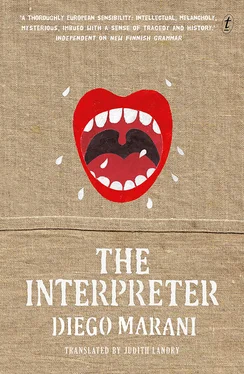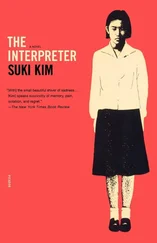‘Leave her alone. Believe me, Roxana’s interest in you is not of the kind that you imagine,’ Mrs Vukobrat told me sharply one evening as we watched my sad friend hurry out into the corridor with the nervous lope of a tracked animal.
‘I assure you, all I want from Mrs Popescu is a bit of company,’ I said firmly but mendaciously to the old woman as she sipped her herbal tea.
‘Roxana has told me all about it!’ exclaimed Mrs Vukobrat, giving me a reproachful look; blushing foolishly, I backed off, embarrassed by the implication that I had tried to take advantage of a sick person and oblige her to satisfy my baser needs. What a misreading of the situation! All I had done was to respond to her entreaties and rattle off some gibberish in Romanian! I didn’t like Mrs Vukobrat; I was irritated by her interference in my relations with Roxana. Noting my animosity towards her, Ortega hastened to inform me of her problems: she was Croatian, from Voivodina, and she had survived a spell in a Serbian lager during the wars in Yugoslavia. During her long months of imprisonment, in order to bear the physical and psychic torture to which she was subjected, she had developed a sort of camouflage reaction: in a word, she had ended up by accepting the thesis put forward by her torturers. She convinced herself that being Croatian was the height of iniquity, that her Croatian identity should indeed be obliterated, dispatched with hatchet blows; she forgot her own language and learned that of her torturers, becoming Serbian in heart and soul. But once she returned to normal life, becoming aware that she had turned into the worst of her own enemies, speaking the language of her people’s murderers and forgetting her own, she attempted suicide, hoping to kill the Serbian tumour which had swelled up within her, strangling the true Ivanka Vukobrat. In the language clinic she had been directed towards an intensive course of Maltese, the language par excellence most foreign to her among the Indo-European tongues; Dr Barnung was using small doses of hypnosis to restore her to her own mother tongue, Croatian. But she was old, her mind had been rendered inflexible by the terrors of the lager, and hopes of a recovery were extremely remote. Hearing her story failed to make me feel any more kindly towards Mrs Vukobrat, though after her reprimands I was nonetheless careful not to renew my approaches to Roxana. I remained courteous and friendly at table, always ready to engage in conversation should she show any desire to do so, but as soon as the fruit plates were cleared away and the vases of dried flowers replaced on the refectory tables, I would bid her a demure goodnight and leave her to a tete-a-tete with her old friend, without making the slightest attempt to intervene. She seemed relieved that I had withdrawn from the fray, and would give me what seemed to me a grateful look, which further convinced me that perhaps Mrs Vukobrat had been right — she had no interest in me. I would go off to listen to Ortega’s chatter, or listen to a little music, gazing up at the square of starry sky above the courtyard.
At the beginning of February we found the courtyard piled high with snow, its chill glow spreading into the rooms and reflecting the sun’s light. The nights too were lighter now; from my bedroom I could see the moon sail by in the sky as though through the porthole of a spaceship, its oceans taking on the form of faces I seemed to recognise before falling into the cloudy embrace of sleep. I often woke up with the strange impression that I could hear voices, or some noise in the room, some distant shout that had made its way across the ether and had come to die within these walls. I even went as far as checking the cupboard and bathroom, rummaging around under the bed, without the faintest idea of what I was looking for. I ended up by thinking that all that light must have disturbed my sleep; I pulled the curtains to as best I could and stopped thinking about it. It was at that time that Kwiatkowski disappeared; he failed to turn up for supper for several evenings on end; then Frau Goldstein spilled the beans.
‘He’s had an attack; it’s serious, he’s got to do an intensive course in Seroan until further notice. Doctor Barnung even thinks he might have to be transferred to a psychiatric hospital,’ she explained to us in hushed tones, then left the room. We’d seen the last of the colonel at table, and we all suffered from it; conversation languished, Ortega no longer had anyone to tangle with. Even Vidmajer would glance up from his plate and cast a bewildered look around the room; Vandekerkhove could no longer engage so satisfyingly in his ramblings; he no longer had a foil, and he soon ran aground, repeating himself like a stuck gramophone record, stuttering over the last disordered words of a speech of which he’d lost the thread.
Roxana too missed Kwiatkowski; she had a blank look about her, though her air of habitual guardedness seemed less pronounced. But she was clearly more deeply troubled by something else, and I could not imagine what it was. She no longer went to chat with Mrs Vukobrat after supper, no longer attended the Thursday recitals; she would rush up to her room without even saying goodbye to her friend, who would be waiting for her in her usual armchair with her glass of herbal tea steaming before her on the little table with its fussy doilies. Roxana, my mysterious friend, had changed beyond recognition: she no longer talked to me, not even at table; she scarcely glanced in my direction. Mrs Vukobrat too was surprised by this development and would cast me inquiring looks, to which I would respond nervously with a quick shake of the head. Roxana even seemed to shun me when it came to our therapeutic activities; each afternoon, at the end of the intensive course in German, in order to avoid being alone with me in the corridor, she would make some excuse to have herself escorted back to her room by the nurse, looking at me out of the corner of her eye as she crept off, as though afraid that I might follow her. In the gym she always tried to find a place as far from me as possible, and she was always the first to leave her desk and scuttle off when the bell rang.
Some time later, though, it happened again, this time in the early afternoon. I was asleep in my room after my intensive course in Romanian when I heard a knock at the door. Roxana came in, looking even more agitated than she had on the previous occasion. I was on the point of pulling myself out of bed — I was still half-asleep. I was having trouble focusing and I was flailing around looking for something to pull myself up with. But Roxana grabbed my wrists and pushed me back onto the pillow; then she straightened up and gestured to me to keep quiet; her lips were trembling.
‘This time it’s going to be me who does the talking!’ she informed me in Romanian, her eyes sparkling.
‘Just get me talking, it doesn’t matter what about! Ask me boring questions, anything, just as long as you get me talking in Romanian!’ I didn’t know what to say; my brain had clouded over, my mouth felt gummy, my throat completely dry. There was something absurd and unreal about her request.
‘What…I mean, have you changed your mind?’ I asked, propping myself up clumsily on my elbows.
‘I can’t help myself — I need my language, do you hear? I have to speak!’ She seemed to relish every word she spoke, savouring each sound until it died on her lips.
‘So, tell me about yourself. Where were you born? What did you do in life before coming here?’
‘I was born in Constanta, on the Black Sea. Until a few months ago I was the director of the town aquarium, I dealt with fish, octopuses, molluscs; my speciality was the reproductive systems of crustaceans, I would rear dozens of them in little glass phials. At first they’re like fragile little spiders which would fit on your fingertip. Did you know that a lobster grows a centimetre a year? My favourites are the blue variety — even lobsters may show signs of nobility. I was happy in my aquarium, perhaps a bit lonely, but I wasn’t the only one. And then he came along…’ She shivered slightly as she spoke, as though she knew that I would find those words disturbing.
Читать дальше












